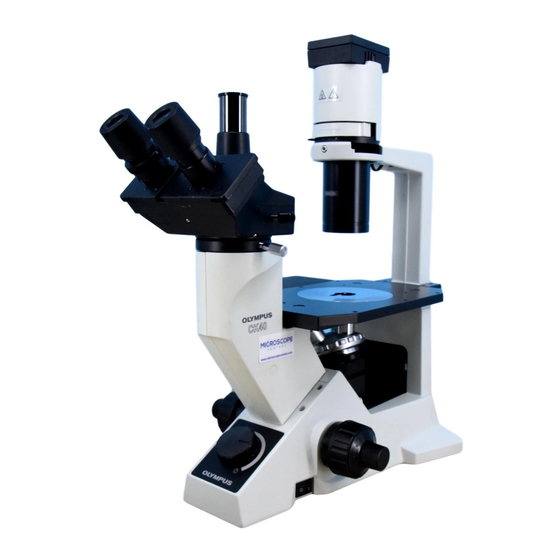Olympus CK30 Інструкція з експлуатації - Сторінка 22
Переглянути онлайн або завантажити pdf Інструкція з експлуатації для Мікроскоп Olympus CK30. Olympus CK30 39 сторінок. Culture microscope

5-4 Illumination Unit
Aperture iris
diaphragm image
Objective pupil
@
17
70 – 80%
30 – 20%
Fig. 30
Fig. 31
1
Using the Filter
}Use filters as needed to increase the accuracy of observation and photo-
micrography. The LBD filter is especially recommended for observation
and photomicrography since it achieves more neutral colors.
}Filters can be stacked in the filter holder. (Maximum thickness: 11 mm)
Filter
IF550
ND6, ND25
LBD
IR cut filter (for CK40)
2
Aperture Iris Diaphragm
} The aperture iris diaphragm determines the numerical aperture of the
illumination system in brightfield observation. It enables you to adjust the
depth of focus, contrast and resolution according to your requirements.
· To confirm the aperture iris diaphragm, remove the eyepiece when nec-
essary (and insert the CT-5 if you have one). Then look into the eyepiece
sleeve; you will see the field of view as shown in Fig. 30. Now adjust the
aperture iris diaphragm lever as required.
· In general, when observing a dyed specimen, set the condenser aper-
ture iris diaphragm to 70 – 80% of the N.A. of the objective in use. How-
ever, when observing a culture specimen – – since it is not dyed – – set the
aperture iris diaphragm lever to "
3
Removing the Condenser Lens
}To provide more operation space, turn the condensor´s lower section @
clockwise (when viewed from above) and remove it. When you do this,
however, keep in mind that proper illumination cannot be achieved. Re-
move the condenser lens only when using a large culture vessel.
Purpose
Monochrome contrast filter (green)
Light intensity adjustment filter
(transmittance: 6%/25%)
Color temperature conversion filter
(for observation/photomicrography)
For exposure time compensation in photo-
micrography
".
(Fig. 30)
(Fig. 31)
